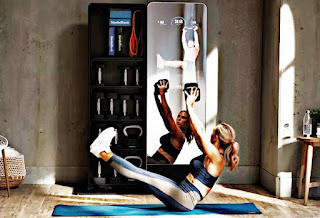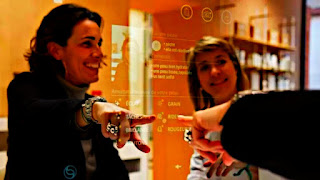For most people, the idea of exercising is not very appealing. We don't like to see ourselves in this 'good' state while sweating on a treadmill or drawing on weights.
Yet anyone who goes to the gym for exercise knows that there are people everywhere who stare at their reflection in a mirror as big as the floor and like to compliment themselves.
Smart Fitness Mirrors are 6-foot (180 cm) tall, vertical, high-tech mirrors with a computer system that connects to the Internet and also acts as a video screen.
The idea is that you are in touch with an online trainer, who then appears on the mirror screen with your mirror, and in the more modern models of these mirrors, cameras and speakers are mounted on the mirror and you The trainer can not only observe your movements but also adjust the exercise patterns as you see fit.
Users have the option to join live one-to-one lessons or group classes during a variety of exercises, including weightlifting, pilates, cardio and yoga.
Video and sound on simple smart mirrors go only one way, you can see and hear the trainer but on the other hand he cannot hear you. Exercise lessons aren't usually live, you can access the library of streamed exercise videos instead.
The first such mirror to be sold in the UK was the Waha. A German firm of the same name made a similar smart mirror last year and sold it in the German market. Its competing brands include Tunnel, Mirror, Nordic Track, Portal and Proform.
Waha offers its mirror a complete personalized, detailed session for body, mind and nutritional health.
But is there any real benefit in watching yourself exercise?
Miss Colin Logan is vice president of public relations at iFit, which makes Nordic Laric and ProForm glasses.
Colin says that by looking at oneself in the mirror, the user can adjust his shape (or position) so that he can get the best out of it while exercising. Exercise vigorously and reduce shape errors that can lead to injuries.
"Even for those who exercise regularly, we know that there are many people who suffer from body disorders or eating disorders and it can be annoying for them to look at themselves in the mirror while exercising. '
A similar form of high-tech mirror, the 'Smart Wellness' mirror, is now being introduced in the market, which uses sensors and artificial intelligence to assess the skin and basic health of the user.
A French firm, Care OS, makes two products that are best suited to replace an existing mirror over a sink in your bathroom and are designed for this purpose.
Its mirrors use a camera and infrared and ultraviolet light sensors to analyze a person's skin and temperature and then suggest a number of care routines. Users can also access subscription-based skin care tutorials.
Dr. Anub Picker Hill says that nothing can be said for sure about the correct information of smart mirrors.
Psychologist Dr. Elena Touroni is also concerned about smart mirrors for both fitness and fitness.
She says that for someone who is already focused on perfection and is probably already seeing every 'flaw' in their body, these mirrors can add to the psychological difficulties.
Lee Chambers, another psychologist, agrees that people are at risk of becoming obsessed with "working for perfection."
Still, he says, smart mirrors have the potential to "empower health choices and change health attitudes."
He added that the exercise mirror should be very useful for those who do not have time to go to the gym but still want someone's opinion on how they are doing.






.png)





0 Comments